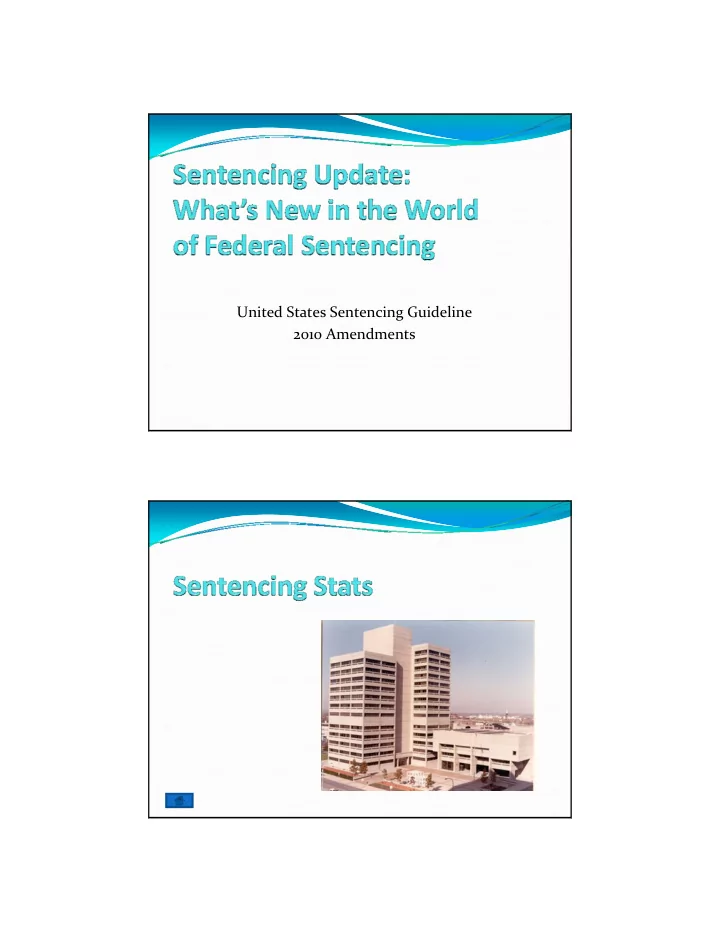

United States Sentencing Guideline 2010 Amendments
FY 2009 Within Range Sentences � National 56.8% (59.4 FY 2008) � 4th Circuit 62.8% (66.3 FY 2008) � E.D.N.C. 56.3% (56.2% FY 2008) Average Length of Prison � Drug trafficking: National 81.2 months EDNC 156.3 � Firearms: National 91.5 EDNC 134.4 � Pornography/Prostitution: National 121.2 EDNC 258.6
� � ALTERNATIVES TO INCARCERATION
Zone Expansion Zone C to B for Treatment Alternative
5C1.1 n. 6 and 8 � D abuser of drugs/alcohol or suffer from a significant mental illness � Defendant’s criminality is related to the treatment problem to be addressed � Consider likelihood of success of program and whether lesser sentence will increase risk to public from further crimes of D � Consider effectiveness of treatment program Chapter 5, Part H � Revises 4 Policy Statements on Offender Characteristics � Age � Mental and Emotional Conditions � Physical Condition, Including Drug/Alcohol Dependence � Military Service � Revises Intro Commentary
5 H1.1 Age
� “Recidivism rates decline relatively consistently as age increases.” USSC, Measuring Recividism � Gall (age at time of offense) � Gray, 453 F.3d 1323 (11 th Cir. 2006) ( 5H1.3 Mental and Emotional Conditions
5H1.4 Physical Condition, Including Drug/Alcohol Dependence Military Service
Cultural Assimilation 2L1.2, n. 8 � Defendant formed cultural ties primarily with the United States from having resided continuously in the United States from childhood � Those ties provided primary motivation for the defendant’s illegal reentry or continued presence in U.S. � Departure not likely to increase risk to public from further crimes of defendant
1B1.1 – 3 Step Process � Sets forth a 3 ‐ step process to arrive at appropriate sentence � Could undermine advisory nature of guidelines � Differs from process set forth in Rita and Gall � Requires a court to consider a departure when not raised � May cause judges to take more restrictive view of variances under 3553(a) 3 ‐ step process � (1) The court shall determine the kinds of sentences and the guideline range” by following 8 detailed steps and considering the relevant provisions as “appropriate” or “applicable; � (2) “The court shall then consider Parts H and K of Chapter 5, Specific Offender Characteristics and Departures, and any other policy statements or commentary in the guidelines that might warrant consideration in imposing sentence: � (3) “The court shall then consider the applicable factors in 18 USC 3553(a) taken as a whole.
1B1.1 – 3 Step Process � Tension betten 1B1 and 5h on “as a whole” versus emphasis on uniformity Recency 4A1.1(e)
Hate Crimes � Matthew Shepard & James Byrd, Jr. Hate Crimes Prevention Act created two new offenses: � Appendix A amended to refer 18 U.S.C. 249 offenses to 2H1.1 � USSG 3A1.1 enhancement in subsection (a) covers crimes motivated by gender identity � Appendix A amended to refer 18 U.S.C. 1380 offenses to 2A2.2, 2A2.3, and 2B1.1 Chapter 8 – Sentencing of Organizations � Remediation efforts � Reasonable steps to remedy harm � Ensure compliance & ethics programs effective � Culpability Score � Effective compliance & ethics program – 3 level decrease � Decrease if organization meets 4 criteria � Direct reporting obligations � Simplification of recommended probation conditions
Miscellaneous � Security fraud statute to cover commodities fraud � Theft or damage of Cultural Heritage Resources � Unlawful disclosure of information related to social security eligibility � Iodine upgraded to a list I chemical, increases maximum base offense level to 30 Resources � Determining Your Client’s Likelihood of Success under Community Supervision and Improving the Odds for a Non ‐ Prison Sentence, available at fd.org � David Hemingway and Janet Hinton, Departures and Variances , available at fd.org
Resource Determining Your Client’s Likelihood of Success under Community Supervision and Improving the Odds for a Non ‐ Prison Sentence , available at fd.org.
www.src ‐ project.org
Child Porn Scholarship � Jesse P. Basbaum, Sentencing for Possession of Child Pornography: A Failure to Distinguish Voyeurs from Pederasts (publication forthcoming in Hastling L. Jrnl, May) � http://papers.ssrn.com/sol3/papers.cfm?abstract_id=1 457197 Juror Views on Just Punishment � James Gwin, Juror Sentiment on Just Punishment: Do the Federal Sentencing Guidelines Reflect Community Values? , 4 Harvard Law & Policy Rev. 173 (2010)
Prior Conviction Enhancements in Illegal Reentry Cases � Doug Keller, Why the Prior Conviction Enhancements in Illegal Re ‐ Entry Cases are Unjust and Unjustified (and Unreasonable too) (forthcoming in 51 Boston College L. Rev. (2010)
Recommend
More recommend